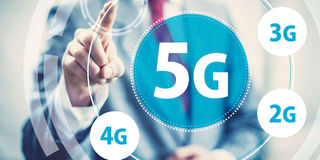What can 5G do for Africa?

5G powers the latest advancements in virtual reality and augmented reality.
What you need to know:
- 5G powers the latest advancements in virtual reality and augmented reality.
- Kenya now at the right path towards a future dominated by the Internet of Things.
Kenyans can now enjoy 5G on their smartphones, thanks to 5G deployment by Safaricom in an infrastructural collaboration with global 5G leaders Nokia and Huawei. Through Safaricom’s home Wi-Fi, over 100 of you can now stream the highest density movies simultaneously at speeds never experienced before in the country.
5G powers the latest advancements in virtual reality, augmented reality and even the idea of holograms, with Kenya now at the right path towards a future dominated by the Internet of Things (IoT).
Faustine Ngila spoke to Mahmoud El-Banna, Head of Digital Industries Sales for China, India, Middle East and Africa at Nokia about what potential the technology holds in Africa.
In which sectors in Africa do you see opportunities for 5G investments?
Africa is a very rich market in terms of the available opportunities for industry digitalization and embracing the different pillars of the Fourth Industrial Revolution (4IR) which are powered by 5G. The mining industry is moving at full speed to adopt a holistic approach to pursue digitalization of their field operations aiming at increasing productivity, reducing operational costs and reducing carbon footprint.
The maritime industry is converging towards a digital platform approach to generate additional use cases that can reduce the cost and time per container move in any port terminal. The manufacturing industry is facing pressure to increase productivity and cope with market competitiveness hence their plans to transform the factories and manufacturing plants to a digital workplace that can increase productivity and improve operational efficiency.
Africa at large is progressing very well towards 4IR however we see some pioneering countries who are taking early steps towards 5G digitalization such as Egypt, Morocco, South Africa, Kenya and Tanzania.
5G has been hailed as the pillar of 4IR. How can African nations use it to move from traditional port business to smart ports and Ports 4.0?
5G is creating a seamless digital platform to support port terminal evolution use cases. These use cases can solve the present challenges but also generate future solutions that can improve port operations and productivity. Port operators are always looking to reduce the cost and time per each container move hence improving the overall productivity index for their operations.
5G can generate use cases as reliable wireless connectivity for manned operations, remote control for automated operations, video surveillance/analytics and identifying lost containers at a much better quality and efficiency compared to the rival technologies. Nokia has field proven deployments worldwide where 5G has been the technology of choice which improved port terminals performance and throughput.
Africa's manufacturing is gradually adopting automation but still suffers low efficiency due to dependence on legacy systems. Which technologies do you believe can get the continent to full automation and what impact would that bring?
The manufacturing industry is seeking multiple ways to accelerate automation as part of their digital transformation strategy. A combination of 5G connectivity, artificial intelligence, machine learning and robotics will generate a multitude of automation use cases across a number of areas such as digital shop floor, digital campuses, connected workers and smart asset management. These use cases will lead to significant positive return on productivity, quality of manufacturing process, cost reduction and health and safety for workers.
From a tech perspective, how can the continent use 5G to achieve improved public safety?
Public safety is a no compromise area for the lives of African citizens. Public safety agencies have recently adopted multiple technologies to enable a variety of mission critical use cases for the public safety industry. The evolution from narrowband technologies to broadband technologies as 5G is unlocking numerous capabilities for public safety users including but not limited to broadband data services, group video calling, video surveillance & analytics, drones surveillance and many other field proven use cases.
However, public safety agencies should consider the upgrade of their legacy terrestrial network to the latest IP/MPLS technology to enable seamless broadband capacity on the access layer which can guarantee superior performance to their applications and use cases. Cybersecurity is seen as an essential domain to secure the broadband networks that public safety agencies will deploy avoiding any possible compromise for these networks.
What challenges do find a roadblock to Africa's future and how can the continent leapfrog these hurdles?
Africa is the land of opportunities where the continent got access to multiple sources of revenues from different industries such as gas, mining, agriculture and maritime. The absence of national broadband networks that can ensure fair access to connectivity in some of the African countries is considered a major hurdle to the economic development of the continent.
There is a sincere need to establish Government Driven Broadband Infrastructure networks where citizens can get access to multiple services among Internet, Education, Healthcare, online trade and many others.
Uninterrupted Power supply still represents another major hurdle to the African continent. Establishing robust electricity networks connected with high speed and low latency broadband connectivity will ensure seamless power supply to the citizens of Africa.
Lastly, the investment in improving the education and healthcare ecosystems will ensure providing quality life to the citizens of Africa which will have direct return on the productivity and efficiency of the different industries.





